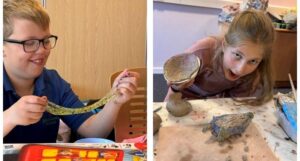
Home > Information > Children Of Single Parents
This is written for children who have lost a parent or whose parents are splitting up.

This is not unusual, in fact 1 in 3 children aged under 16 will experience their parents splitting up.
There are lots of reasons why parents might split up. Usually it’s because one or both of them have decided that they aren’t happy being together anymore. Whatever the reason, it is because of a problem in their relationship, and not because of anything you have done.
You should also remember that even when parents don’t love each other any more, they still love their children. Instead of thinking of your family breaking up, you might find it easier to think of it as changing shape. Both of your parents will still be your family, it will just be a different kind of family.
When parents are no longer together, you may hear it called either getting ‘divorced’ or ‘separating’.
Separating normally means that two people won’t be in a relationship or live in the same house anymore. They have chosen to live their lives separately.
Divorce is what happens when married parents decide they don’t want to be legally married any more. Getting divorced might happen at the same time as your parents are splitting up, but it might happen some time after. Sometimes, parents will stay separated for a long time before they get divorced.
Divorce can take a long time because there is a lot to decide. When two people are married, they legally both own things like their house or a car, but getting divorced means they can’t own those things together any more. Your parents will have to agree these things and they may have to talk to lawyers, or go to court for a judge to decide things if they can’t agree.
Parents who aren’t married still need to make the same decisions, but they won’t have to talk lawyers or go to court. They may still want help or advice from lawyers or other people though, as it’s not always easy to decide.
When parents split up, there are some things that have to be decided. The most important thing is how they will look after their children.
Your parents will have to decide who you will live with and how much time you will spend with each of them. If you are younger than 16, you have to live with one of your parents at all times.
While this is for your parents to decide, you can still talk to them about what you want and ask questions. You might want to write down your questions and thoughts to help you when you’re talking to them.
Another important thing that your parents will decide is how they’ll pay for things you need. If you are only going to see one of your parents occasionally, they will give some money to the parent you spend most of your time with. This is to help them pay for things you need, like food and clothes. Paying money like this is called child maintenance.
Having your parents split up is a very emotional time. You’ll probably experience a lot of different strong feelings including being upset, sad, angry, or confused. All of these are normal and are to be expected when such a big change is happening in your life.
One of the best things to help you feel better is to talk about how you feel. It is important you talk to your parents, so that they understand what you are feeling, and so that you can feel close to them when things are difficult. It can also be helpful to talk to other people who are not in the middle of everything.
Choose someone you trust to talk to about how you feel. They could be:
Sometimes you might want to talk, but don’t know what to say. It can help to write down a list of things that are bothering you, or to draw a picture of how you feel.
It’s also okay if sometimes you don’t want to talk, sometimes you might want to do something else to take your mind off things. Just make sure that when you do feel like you want to talk, you do.
To find out more, you can visit Voices in the Middle, which is a website that helps young people when their parents are splitting up.
You can read the ‘My Family’s Changing’ leaflets from CAFCASS. They have two different leaflets depending on your age.
There are also lots of story books you can read about children whose parents split up, which can help you understand how you feel about what’s happening. See if you like anything in these book lists and ask your parents if you could have some of them to read.
As well as talking to friends and family, the organisations below specialise in helping young people during difficult times.
ChildLine offer help to everyone under 19. You can talk to them about anything on the phone or talk online using 1-2-1 counsellor chat.
The Mix offers support and advice to young people, including answering awkward or embarrassing questions you may not feel confident asking other people. You can use their Crisis Messenger service to have a text conversation if you are having painful emotions or you’re in a crisis.
Kidscape offer help for young people who are being bullied.
Beat helps young people beat their eating disorders, with a helpline, online support, and self-help groups.
Young Stonewall provides advice and support for young lesbian, gay, bi and trans people, as well as those who are questioning their gender or sexual identity.
A parent dying is one of the hardest things that can happen to a young person. It completely changes your life, and as well as feeling sad and upset, you could also feel confused, scared, or angry. This page has a few pieces of advice, as well as links to places where you can get more support.
One of the best things you can do to feel better is to talk to people about how you are feeling. This can be difficult. You might feel like you want to keep everything to yourself, or that you can’t trust other people. While keeping your feelings to yourself might feel like the right thing to do, it can end up making those feelings worse. This doesn’t mean you have to talk about everything all the time, but when you feel you are ready to talk, make an effort to do it.
Choose someone you trust to talk to about how you feel. They could be:
As well as talking about your feelings, it is important to ask for help when you need it. You might need some time to yourself, something to take your mind off things, or maybe just a hug.
Other people might be unsure of what to say or do because they don’t want to upset you, but that doesn’t mean they don’t care. If you need some help, try to ask for it by telling people what you need. If it is difficult to ask for help face to face, try writing them a letter or sending them a private message.
There are many places you can go to for help. As well as talking to friends and family, the organisations below specialise in helping young people like you who have lost someone important to them.
Child Bereavement UK is a charity which helps support young people in different ways, including apps, games, support services, and friendship groups.
Help 2 Make Sense is a site with blogs and podcasts to help young people come to terms with their loss. Most of the advice here comes from young people who have dealt with death themselves.
Hope Again is aimed at helping young people aged 12-18 find their own way of dealing with loss. Their site has vlogs and stories of people who have dealt with death as teenagers. Services include access to support from trained counsellors via telephone and email.
Grief Encounter offers advice through their website and through their helpline which you can call if you need someone to talk to. They have a webchat service if you’d prefer to type rather than call. You can also download their bereavement guide for teenagers.
If you are a parent and would like to find out more about our Family Grant Scheme please fill in the following form to request a call back.
If you are a parent and would like to find out more about our Student-Parent Grant Scheme please fill in the following form to request a call back.

(01274) 223292
The Work and Kids Project is a not-for-profit social enterprise that is dedicated to helping parents and young families across the UK achieve financial and emotional independence.